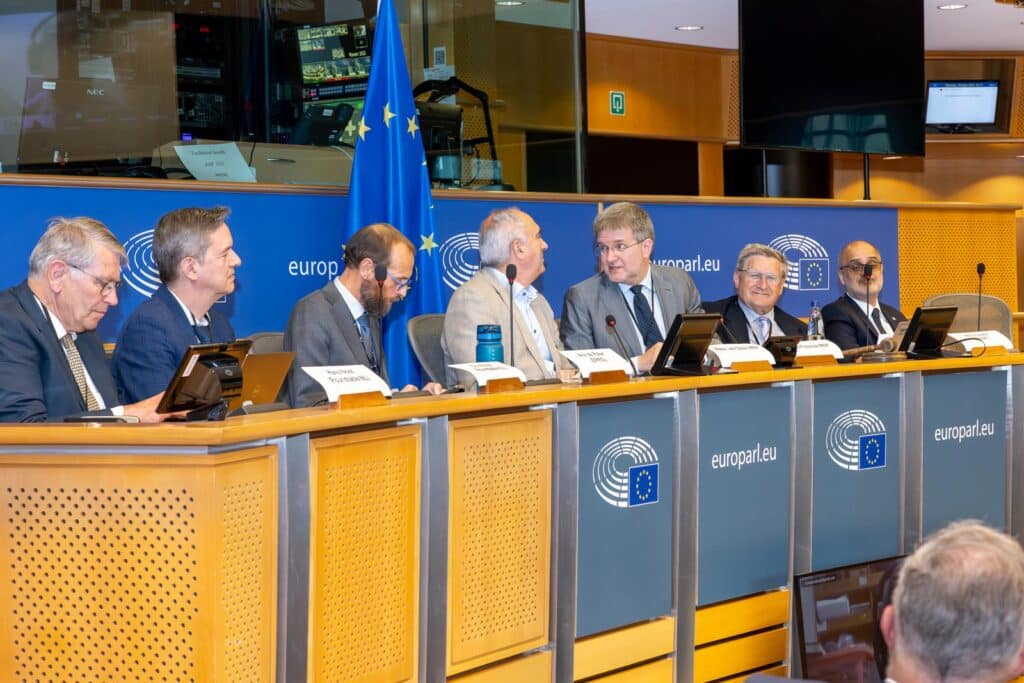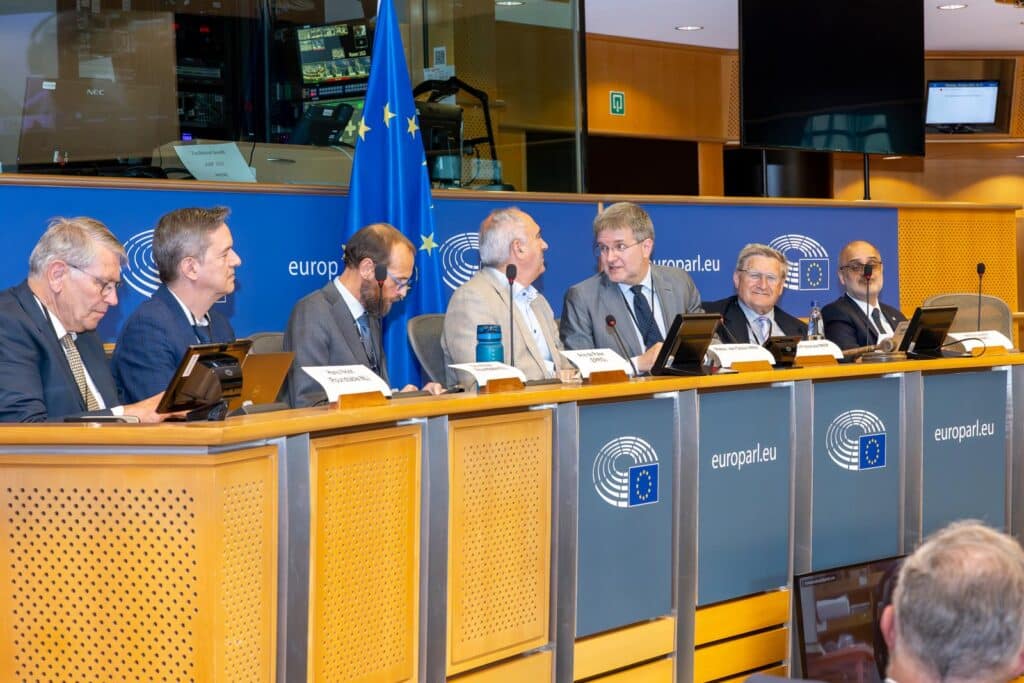Politics
MEP Peter van Dalen’s Farewell to the European Parliament

MEP Peter van Dalen (Christian Union) has announced today on his website his departure from the European Parliament, concluding a remarkable tenure spanning over 14 years. Upon the request of the national executive of the Dutch Christian Union, Van Dalen makes way for Anja Haga, the next candidate on the party’s list, to continue their important work.
Upholding Freedom of Religion or Belief
Throughout his tenure, one of the causes closest to Peter Van Dalen’s heart has been the promotion of religious freedom in Europe and across the globe. He played a pivotal role in co-founding the European Parliament’s Intergroup on Religious Freedom and was instrumental in the establishment of a Special Envoy on Religious Freedom within the European Union. Notably, Van Dalen organized the highly esteemed European Prayer Breakfast, an annual event that attracted dignitaries and visitors from around the world for many years.
Van Dalen underscores the ongoing significance of prioritizing religious freedom, stating:
“More and more Christians worldwide are being persecuted, but at the same time, attention to this growing issue is waning in Europe. This is a very worrying development. Many colleagues do not seem to appreciate the seriousness of this.”
Reflecting on his impactful initiatives, Peter Van Dalen recalls two cases that stand out: the release of Christian Asia Bibi and the Christian couple Shagufta & Shafqat, who were unjustly held on Pakistani death row for several years on charges of blasphemy. From his position in the European Parliament, Van Dalen exerted pressure on the Pakistani government, working closely with Pakistani lawyer Saïf-ul-Malook, to secure their freedom and advocate for the abolition of blasphemy laws. These successes highlight the efficacy of Van Dalen’s unwavering commitment to religious freedom.
Furthermore, Van Dalen has consistently championed the rights of the people of Armenia and the Armenian enclave of Nagorno-Karabakh. The population, predominantly Christian, has long endured oppression from Azerbaijan, an issue that has been largely overlooked by the international community. Van Dalen strongly believes that Europe should provide support to the Armenians in their struggle against belligerent Azeris. Encouragingly, EU foreign chief Borrell recently pledged to take action on this matter, signalling progress towards addressing the ongoing challenges faced by these communities.

Additionally, van Dalen made significant contributions to the development of the European Union Guidelines on Freedom of Religion or Belief. Recognizing the pressing need for a comprehensive framework to safeguard this fundamental human right, Van Dalen played a pivotal role in shaping these guidelines. His expertise and commitment to religious freedom were instrumental in ensuring that the guidelines not only addressed the challenges faced by Christians but also encompassed the broader spectrum of religious communities across Europe.
Peter Van Dalen’s tireless efforts in this regard have left a lasting impact, providing a crucial reference for policymakers and stakeholders working towards the protection and promotion of religious freedom within the European Union, and just the day before announcing his departure, he hosted (together with MEP Carlo Fidanza, Human Rights Without Frontiers, EU Brussels FoRB Roundtable and the Netherlands FoRB Roundtable) a two hours conference within the framework of the 10th anniversary of the guidelines. The conference was well attended by civil society, university students and some MEPs, as well as representatives from different faiths and cosmovisions, from Evangelicals to members of the Church of Jesus Christ of the Later Day Saints, Scientologists and humanists among others.
Protecting the Fisheries Sector
Van Dalen has also been a staunch advocate for the fisheries sector during his time as an MEP. Serving as the vice-chairman of the fisheries committee in the European Parliament, he has witnessed the hardships faced by fishermen in recent years.
Recalling the struggles encountered, Van Dalen states:
“When I started working to preserve pulse fishing from 2017, the Netherlands was already virtually alone in Europe on this important file. More than some extension for use of that gear was unfortunately not in the cards. Combined with the Brexit, the fall in demand for fish during the corona pandemic and the introduction of the landing obligation, among others, our fishery was unfortunately dealt a heavy blow. Together with several Dutch MEPs, we tried all kinds of things to reverse this development, but failed. I deeply regret that. When I now see how many cutters are being scrapped, it turns my stomach.”
Passing the Torch to MEP Anja Haga
Anja Haga has been designated as Peter van Dalen’s successor. With a background as a former Fryslân state member and Arnhem alderman, Haga brings her expertise in nature and climate issues at the European level to the role. She anticipated that:
“It is important to make the Christian-social sound heard again and again. Religious freedom, creation and looking after our neighbour requires our full attention in the coming years, especially also at the European level.”
Peter Van Dalen’s Background
Peter van Dalen embarked on his political career as a policy officer supporting MEP Leen van der Waal in 1984, while affiliated with the RPF party. Since 2009, he has served as an MEP representing the Christian Union, now in his third term of office. In addition to his steadfast commitment to religious freedom and the fisheries sector, Van Dalen has actively engaged with topics such as the euro and the European Union’s foreign policy. Throughout his tenure, he consistently emphasized the importance of preserving the influence and decision-making power of EU member states.
Peter van Dalen’s departure from the European Parliament marks the end of an era characterized by dedication, resilience, and an unwavering commitment to advocating for religious freedom and the well-being of the fisheries sector. His legacy will undoubtedly inspire future generations of policymakers and activists to champion these causes, ensuring a more just and inclusive society within Europe and beyond.
Politics
Parliament adopts reform of the EU electricity market | News
The measures, composed of a regulation and a directive already agreed upon with the Council, were adopted with 433 in favour, 140 against and 15 abstentions, and 473 votes to 80, with 27 abstentions, respectively.
The law will protect consumers against volatile prices. MEPs ensured that they will have the right to access fixed-price contracts or dynamic price contracts, and receive important information on the options they sign up to. Suppliers will not be allowed to unilaterally change the terms of a contract.
MEPs also secured that EU countries can prohibit suppliers from cutting the electricity supply of vulnerable customers, including during disputes between suppliers and customers.
Contracts for Difference
The legislation provides for so-called “Contracts for Difference” (CfDs), or equivalent schemes with the same effects, to encourage energy investment. In a CfD, a public authority compensates the energy producer if market prices fall too steeply, but it collects payments from them if prices are too high. The use of CfDs will be allowed in all investments in new electricity production, whether from renewable or nuclear energy.
Electricity price crisis
The text sets out a mechanism to declare an electricity price crisis. In a situation of very high prices and under certain conditions, the EU may declare a regional or EU-wide electricity price crisis, allowing member states to take temporary measures to set electricity prices for SMEs and energy intensive industrial consumers.
Quote
“This reform puts citizens at the forefront of electricity market design. The text includes measures to protect citizens, especially the most vulnerable and to accelerate the deployment of renewable energy sources. The Parliament has taken a step forward in democratising energy, creating a market design that responds to the failures exposed by the energy crisis. All consumers, including micro, small, and medium-size enterprises will have access to long-term, affordable and stable prices.” lead MEP Nicolás González Casares (S&D, ES) said.
Next steps
After Parliament’s approval, Council also needs to formally adopt the legislation to become law.
Background
Energy prices have been rising since mid-2021, initially in the context of the post-COVID-19 economic recovery. However, energy prices rose steeply due to gas supply problems following Russia’s war against Ukraine in February 2022. High gas prices had an immediate effect on electricity prices, as they are linked together under the merit order system, where the most expensive (usually fossil fuel-based) energy source sets the overall electricity price.
Source link
Politics
Women must have full control of their sexual and reproductive health and rights
MEPs urge the Council to add sexual and reproductive healthcare and the right to a safe and legal abortion to the EU Charter of Fundamental Rights.
In a resolution adopted on Thursday with 336 votes in favour, 163 against and 39 abstentions, MEPs want to enshrine the right to abortion in the EU Charter of Fundamental Rights – a demand they have made several times. MEPs condemn the backsliding on women’s rights and all attempts to restrict or remove existing protections for sexual and reproductive health and rights (SRHR) and gender equality taking place globally, including in the EU member states.
They want Article 3 of the Charter to be amended to state that “everyone has the right to bodily autonomy, to free, informed, full and universal access to SRHR, and to all related healthcare services without discrimination, including access to safe and legal abortion”.
The text urges member states to fully decriminalise abortion in line with the 2022 WHO guidelines, and to remove and combat obstacles to abortion, calling on Poland and Malta to repeal their laws and other measures that ban and restrict it. MEPs condemn the fact that, in some member states, abortion is being denied by medical practitioners, and in some cases by entire medical institutions, on the basis of a ‘conscience’ clause, often in situations where any delay will endanger the patient’s life or health.
Education and high-quality care
Abortion methods and procedures should be an obligatory part of the curriculum for doctors and medical students, Parliament says. Member states should ensure access to the full range of SRHR services including comprehensive and age-appropriate sexuality and relationship education. Accessible, safe and free contraceptive methods and supplies, and family planning counselling, should be made available, with special attention paid to reaching vulnerable groups. Women in poverty are disproportionately affected by legal, financial, social and practical barriers and restrictions to abortion, MEPs say, calling on member states to remove these barriers.
Stop EU funding to anti-choice groups
MEPs are concerned about the significant surge in funding for anti-gender and anti-choice groups around the world, including in the EU. They call on the Commission to ensure that organisations working against gender equality and women’s rights, including reproductive rights, do not receive EU funding. Member states and local governments must increase their spending on programmes and subsidies to healthcare and family planning services.
Background
France became the first country to enshrine the right to abortion in its constitution on 4 March 2024. Healthcare, including sexual and reproductive health, falls under national powers. Changing the EU Charter of Fundamental Rights to include abortion would require unanimous agreement from all member states.
Politics
MEPs approve reforms for a more sustainable and resilient EU gas market
On Thursday, MEPs adopted plans to facilitate the uptake of renewable and low-carbon gases, including hydrogen, into the EU gas market.
The new directive and regulation on the gas and hydrogen markets aim to decarbonise the EU’s energy sector, enhancing the production and integration of renewable gases and hydrogen.
These measures are designed to secure energy supplies disrupted by geopolitical tensions, particularly the Russian war against Ukraine, and address climate change. In negotiations with Council on the directive, MEPs focused on securing provisions around transparency, consumer rights, and support for people at risk of energy poverty. Plenary adopted the directive with 425 votes in favour, 64 against and 100 abstentions.
The new regulation, adopted with 447 votes in favour, 90 against and 54 abstentions, will beef up mechanisms for fair pricing and stable energy supply, and will allow member states to limit gas imports from Russia and Belarus. The legislation will introduce a joint gas purchasing system to avoid competition among member states and a pilot project to bolster the EU’s hydrogen market for five years.
The regulation also focuses on increasing investments in hydrogen infrastructure, especially in coal regions, promoting a transition to sustainable energy sources like biomethane and low-carbon hydrogen.
Quotes
“Europe’s steel and chemical industries, which are hard to decarbonise, will be placed at the centre of the development of a European hydrogen market,” lead MEP on the directive Jens Geier (S&D, DE) said. “This will enable fossil fuels to be phased out of industry, secure European competitiveness, and preserve jobs in a sustainable economy. Unbundling rules for hydrogen network operators will correspond to existing best practices in the gas and electricity market.”
Lead MEP on the regulation Jerzy Buzek (EPP, PL) said: “The new regulation will transform the current energy market into one based primarily on two sources – green electricity and green gases. This is a huge step towards meeting the EU’s ambitious climate goals and making the EU more competitive on global markets. We have introduced a legal option for EU countries to stop importing gas from Russia if there is a security threat, which gives them a tool to phase out our dependence on a dangerous monopolist.”
Next steps
Both texts will now have to be formally adopted by Council before publication on the Official Journal.
Background
The legislative package reflects the EU’s growing climate ambitions, as set out in the European Green Deal and its ‘Fit for 55’ package. The updated directive aims to decarbonise the energy sector and includes provisions on consumer rights, transmission and distribution system operators, third-party access and integrated network planning, and independent regulatory authorities. The updated regulation will push existing natural gas infrastructure to integrate a higher share of hydrogen and renewable gases, by means of high tariff discounts. It includes provisions to facilitate blending hydrogen with natural gas and renewable gases, and greater EU cooperation on gas quality and storage.
-

 EU & the World7 days ago
EU & the World7 days agoMorgan Wallen’s Ex KT Smith Responds to Rumor That His Arrest Is Related to Her Marriage Announcement
-

 EU & the World7 days ago
EU & the World7 days ago‘Joker: Folie a Deux’ New Trailer Unveiled: Everything We Know About the New Movie
-

 EU & the World6 days ago
EU & the World6 days agoBlake Lively Gushes About ‘Dreamy’ Husband Ryan Reynolds Ahead of His New Movie ‘If’
-

 EU & the World6 days ago
EU & the World6 days agoJax Taylor and Brittany Cartwright Get Candid About Their Sex Life Before Breakup
-

 EU & the World7 days ago
EU & the World7 days agoWho Is Aoki Lee Simmons? 5 Things About the Model Who Split From Vittorio Assaf
-

 Sports6 days ago
Sports6 days agoElia Caprile, agent dribbles on future
-

 Sports5 days ago
Sports5 days agoPrimoz Roglic skips Fleche Wallonne and Liège-Bastogne-Liège
-

 EU & the World7 days ago
EU & the World7 days agoJelly Roll Reveals the Reason Why He Turned Down Taking a Photo With Diddy Last Year









